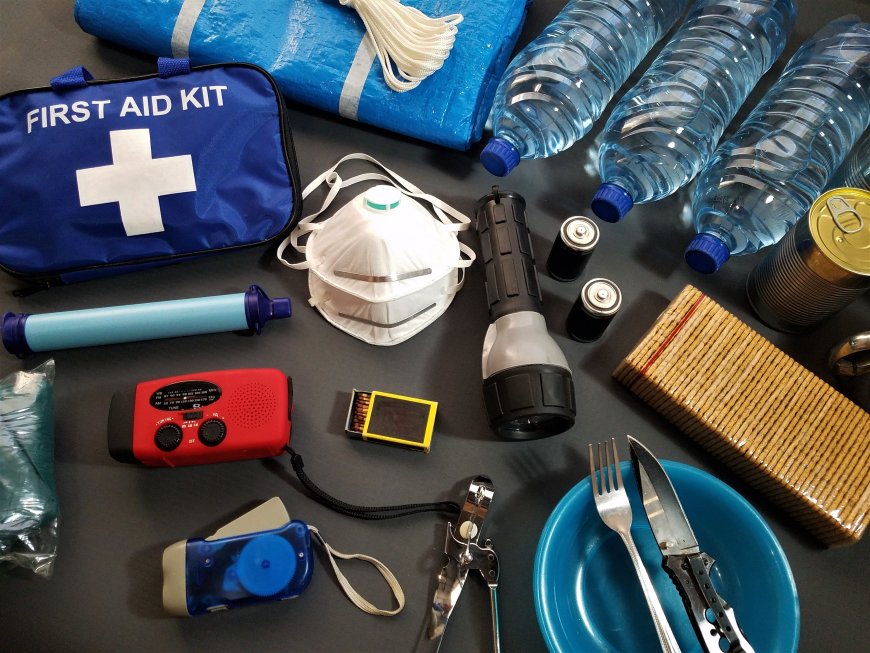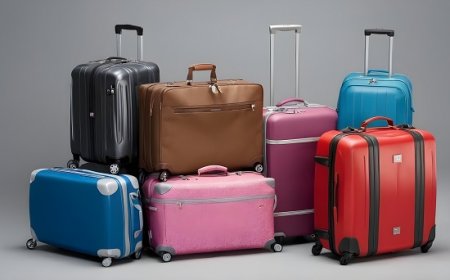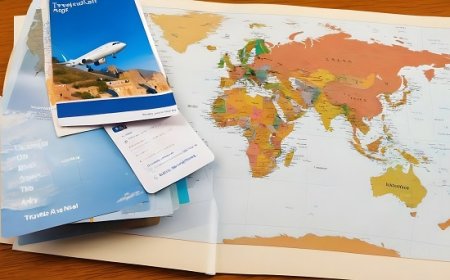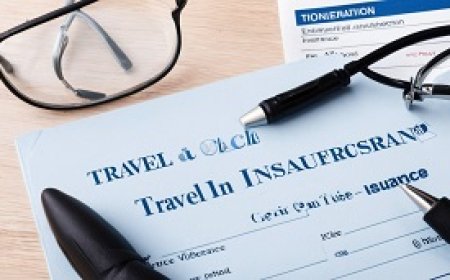How to Prepare for Health Emergencies While Traveling
Before traveling, it is advisable to take steps to prepare for health emergencies such as preparing an emergency kit including essential medications, downloading relevant medical apps, checking healthcare facilities in potential travel destinations, and sharing travel details with family members to ensure an effective response in case of a health emergency

Before traveling, it is advisable to take steps to prepare for health emergencies such as preparing an emergency kit including essential medications, downloading relevant medical apps, checking healthcare facilities in potential travel destinations, and sharing travel details with family members to ensure an effective response in case of a health emergency.
How to Prepare for Health Emergencies While Traveling
The importance of preparing for health emergencies before traveling is evident in the need to avoid potential health risks and ensure personal and health safety during trips. Preparedness for health emergencies is an essential part of travel planning, as unforeseen health risks can occur at any time and in any place. Therefore, thorough preparation and pre-packaging of a health emergency kit are of utmost importance. This preparation includes stocking up on essential medications and medical supplies, as well as familiarizing oneself with healthcare facilities and services at the intended destinations. By preparing for health emergencies, travelers can effectively handle any health-related emergencies and maintain their safety and the safety of others while they are in unfamiliar places.
Preparing a health emergency kit for travel
Preparing a health emergency kit for travel is an essential part of health emergency preparedness, aiming to provide the necessary medical resources to address any potential health emergency during the trip. The emergency kit should contain a variety of medications and medical supplies that may be needed in potential emergency situations.
First and foremost, personal essential medications should be included in the emergency kit, such as medications used to treat chronic conditions, allergies, or pain. It is also important to include medications for treating common infectious diseases such as diarrhea and colds.
In addition to medications, the emergency kit should include medical tools and supplies such as bandages, disinfectants, medical gloves, antihistamines, a thermometer, antiemetics, and insect repellents.
Furthermore, the emergency kit should contain important medical documents such as copies of prescriptions, health insurance cards, and contact information for your healthcare provider.
Depending on personal health requirements and the intended travel destination, the emergency kit can be customized to meet your specific needs. By providing the appropriate health emergency kit, travelers can better prepare to handle health emergencies and maintain their safety and the safety of others while traveling.
Essential medications and medical supplies for emergencies during travel
When considering essential medications and medical supplies for emergencies during travel, various factors such as the intended destination, personal health condition, and availability of healthcare at the destination should be taken into account. Preparing a health emergency kit should include a range of medications and medical supplies that can be useful in health emergency situations.
Firstly, essential medications taken regularly should be included in the emergency kit. Travelers should take an adequate supply of their prescribed medications for the duration of the trip, along with some extra doses in case of unexpected delays in return.
In addition to chronic medications, some basic emergency medications should be included, such as pain relievers, antihistamines, anti-diarrheals, antiemetics, and fever reducers. These medications may be necessary in sudden emergency situations such as headaches, allergies, or food poisoning.
Alongside medications, medical supplies such as clean bandages, disinfectants, medical gloves, a thermometer, and insect repellents should be included. These supplies can be of great importance in dealing with minor injuries and other emergency situations.
By preparing a health emergency kit with the appropriate medications and medical supplies, travelers can effectively deal with health emergencies that may occur during travel, ensuring their safety and the safety of others at all times.
Identifying healthcare centers and hospitals in travel destinations
When planning for travel, identifying healthcare centers and hospitals in travel destinations is considered an essential part of health emergency preparedness. This aims to provide the necessary resources for immediate treatment in cases of medical emergencies that may arise during travel.
First and foremost, it is advisable to research medical centers and hospitals in the travel destination beforehand. This can be done through online searches, consulting travel agencies, or contacting the embassies of the intended countries. It is also crucial to ensure that these centers provide the necessary medical care for various health conditions, including acute emergencies and complex medical cases.
Secondly, it is recommended to store the contact information of selected medical centers in the mobile phone or write them down on paper. This information should include addresses, phone numbers, working hours, and any additional details that may be helpful.
Thirdly, it is also important to review health insurance policies to verify whether they cover healthcare costs abroad and whether they require specific procedures to obtain medical assistance.
Finally, travelers should share this information with family members or travel companions and ensure they are aware of how to access medical centers in case of emergencies.
By identifying healthcare centers and hospitals in travel destinations, travelers can better prepare for health emergencies and effectively respond to emergencies, enhancing safety and comfort during the travel period.
Medical applications and electronic resources
Medical applications and electronic resources play a crucial role in health emergency preparedness during travel, providing information and tools to better handle sudden medical conditions.
Firstly, medical applications can be used to access accurate and reliable medical information about diseases, medications, and medical procedures. Travelers can download apps that offer health tips, information about symptoms and treatments, and emergency first aid guidelines.
Secondly, some medical apps offer online consultation services with qualified doctors, allowing travelers to receive quick medical assessment and advice in case of health emergencies without the need to visit a medical facility.
Thirdly, travelers can use apps to search for nearby healthcare centers and hospitals in travel destinations, including contact information, addresses, and user ratings.
In addition to apps, electronic resources such as websites and medical forums provide valuable information about health and safety during travel. Tips on nutrition, fitness, disease prevention, and how to deal with potential health emergencies can be found.
It is essential for travelers to download appropriate medical apps and consult health-related electronic resources before traveling. By doing so, travelers can enhance their preparedness for health emergencies and effectively respond to emergencies, promoting safety and comfort during their trips.
Documenting personal health information
Documenting personal health information is an essential part of preparing for health emergencies while traveling, as it helps facilitate rapid and effective medical care in emergency situations. This information can be documented in several ways
Firstly, travelers should keep copies of their personal medical records and include them in their health emergency kit. These records may include information about past medical conditions, surgeries, allergies, chronic diseases, and regularly used medications. It is important to accurately document this information and keep it updated regularly.
Secondly, it is advisable to maintain a list of important medical contacts for emergencies, such as the name and phone number of the personal physician, preferred hospitals, and the local healthcare network in the travel destination. This list can help in obtaining medical assistance quickly in emergency situations.
Thirdly, it is also preferable to carry a copy of the health insurance card and ensure that it is updated with correct and current information. This card should include information about the insurance company, policy number, and whether it covers medical costs abroad.
By documenting personal health information and keeping it organized and easily accessible, travelers can better prepare for health emergencies and effectively respond to emergencies, enhancing safety and comfort during the travel period.
Steps for effective response to health emergencies while traveling
Steps for effective response to health emergencies while traveling include several key steps to ensure proper and prompt intervention in medical emergencies
1. Preparing in Advance
- Before traveling, travelers should prepare an emergency health kit and ensure that all necessary medications are available and carried.
- Personal health information should also be documented and regularly updated.
2. Readiness to Act
- In case of a health emergency, travelers should remain calm and quickly and accurately assess the situation.
- A safe position for the patient should be identified, and immediate medical assistance should be secured if required.
3. Contacting Medical Assistance
- Local emergency services should be contacted or assistance should be requested from hotel staff or police if available.
- Using medical apps or mobile phones, medical services can be contacted through them.
4. Providing First Aid
- While awaiting medical assistance, first aid should be provided to the patient, including basic life support and providing comfort and psychological support.
5. Staying Connected
- Travelers should stay connected with medical staff and provide necessary information about the patient's condition and the current situation.
6. Follow-up and Evaluation
- After receiving medical treatment, the patient's condition should be monitored, and the response to treatment should be evaluated.
- Travelers should continue to monitor the patient's condition and ensure improvement or the need for further treatment.
By following these steps, travelers can effectively respond to health emergencies while traveling, helping to maintain their safety and the safety of others and ensuring a prompt and appropriate response to the medical condition.
Summary
Preparing for health emergencies while traveling requires advance planning and equipping oneself with the necessary tools and information to handle potential health emergencies that may arise during the journey. This includes preparing a medical emergency kit with essential medications and first aid supplies, along with documenting personal health information and regularly updating it. Preparedness for health emergencies also involves steps to identify healthcare facilities in travel destinations and familiarizing oneself with useful medical apps and electronic resources. With effective response and prompt action, travelers can ensure their safety and the safety of others during their trips.
Sources
1. CDC Travelers' Health: The Centers for Disease Control and Prevention (CDC) website provides information on recommended vaccinations for travelers, tips to avoid infectious diseases, and how to handle health emergencies while traveling.
2. International Society of Travel Medicine (ISTM): The official website of the International Society of Travel Medicine offers information on public health and personal safety during travel, including preparing for health emergencies and resources available to travelers.
3. Travel Health Pro: Managed by the UK government, Travel Health Pro provides information on public health and medical advice for travelers, including health risk assessments for different destinations and information on vaccinations and infectious diseases.
4. American Red Cross: The official website of the American Red Cross offers information on preparing for medical emergencies and first aid procedures to take in health emergencies.
What's Your Reaction?




























































































































































